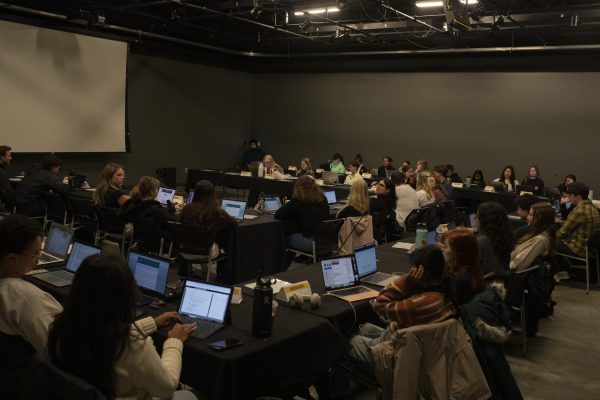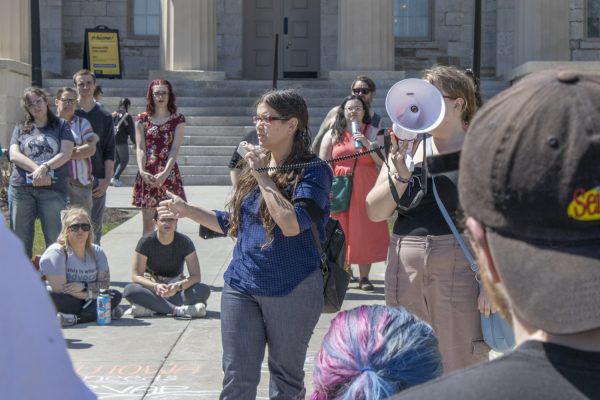Networking essential to get ahead in today’s job market, experts say
Nearly 80 percent of jobs are not published. Instead, these positions are filled by connections made by networking. In today’s age, is it who you know, or what you know?
Peer advisors (from left) junior Magdalena Caro, senior Caden Crandall, senior Melanie Taylor, and Senior Director of Operations for the Pomeranz Career Center Angi McKie pose for a portrait in the Pomeranz Center on Oct. 9, 2018. The Pomeranz Career Center helps students work on their resumes, network within their fields, and plan a career path for after graduation.
October 10, 2018
The University of Iowa School of Journalism and Mass Communications recently held its annual Speed Networking event, allowing students to speak to 50 recruited professionals from a variety of professional backgrounds. Experts say this type of networking is an important part of finding a job.
Networking opportunities for UI students are available all over campus, from career fairs held by the Pomerantz Career Center to simply getting involved in student organizations.
Garry Klein, the director and career coach of Pomerantz Career Center, said networking has always been an important part of finding a career. However, recent statistics from Career Horizons say nearly 80 percent of available jobs today are not published, making professional networking seem all the more necessary for students hoping to land their dream jobs after college.
Klein said that, for students, finding a job or internship requires a combination of what a student knows and who a student knows.
“I think it’s helpful to have contact with people, of course, but [employers] still have to know what you can do that benefits them,” Klein said. “Part of good networking is being sure you’re clear about why you’re there and what you are about.”
Paul Jensen, the internship and placement coordinator for the journalism school, said talking to potential employers can mean gaining enough interest for them to give an applicant’s résumé one extra look before making a decision.
Jensen believes getting a job is not just what a student knows or who a student knows.
RELATED: Hedge: Getting involved on campus is vital
“It’s who knows what you know,” he said.
The Pomerantz Center offers several opportunities for students to network. Klein said one opportunity it offers are practice interviews with employers.
“It’s a way to practice interviewing, but at the same time, you get to spend some one-on-one time with someone who’s in a position to can help you find a job,” he said.
Angi McKie, the senior director of operations at the Pomerantz Career Center, said her best advice for beginning students looking for potential careers is to start small and early.
[Networking] never really stops. It just looks different depending on the career path.
— Angi McKie
“Go to things that are already structured on campus; you don’t have to build your own networking opportunity,” she said. “Go to the events that the student organizations are hosting where they’re bringing in professionals and start in that kind of structured environment.”
McKie said the Pomerantz Center absolutely encourages students to take advantage of networking opportunities and agreed that networking may be absolutely necessary depending on the job a student wants in today’s world.
“I feel like it’s important for all [jobs], but it looks different in each industry,” she said. “[Networking] never really stops. It just looks different depending on the career path.”
While networking may not be a new concept, its importance is no less prominent for students today, Jensen said. He said though the idea itself may seem ominous, networking can be learned and easier than people think.
“People get a little scared of it, and they shouldn’t, because it’s really about making friends,” he said. “And who doesn’t need more friends?”
















